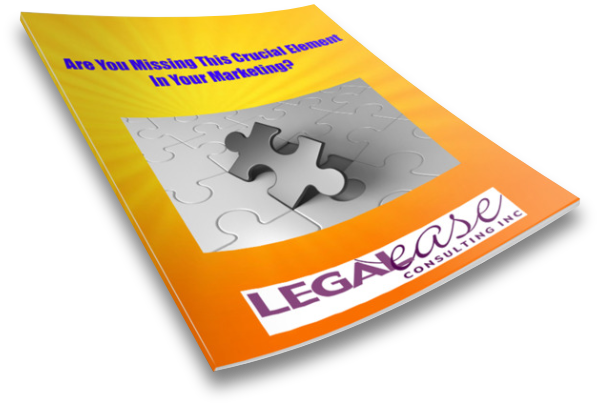 I just read a great article in the December 2005 Harvard Business Review, entitled, “How to Build Your Network,” by Brian Uzzi and Shannon Dunlap. The article also references The Tipping Point, by Malcolm Gladwell. Both are interesting reads about how networks work,and how to make them work effectively for you.
I just read a great article in the December 2005 Harvard Business Review, entitled, “How to Build Your Network,” by Brian Uzzi and Shannon Dunlap. The article also references The Tipping Point, by Malcolm Gladwell. Both are interesting reads about how networks work,and how to make them work effectively for you.
When I was still with my firm, once some of the attorneys really began to get interested in marketing, they found some networking groups to join. Before long, although different attorneys from the office had joined different groups, they noticed that they were seeing all of the same people. The contacts we were making as a firm weren’t as broad as we expected, because the groups were populated by all of the same people.
According to Uzzi and Dunlap, there are a number of factors that can contribute to these kinds of network problems. The first is the ‘self-similarity principle;’ when making contacts, we choose people who are too similar to us. Another problem in network building is the ‘proximity principle,’ in which people tend to populate their networks with people they spend the most time with. These two factors can result in what Uzzi and Dunlap call the ‘echo chamber’ effect, when over time, people introduce their contacts to one another, and the similarity of thought and skill reverberates.
One thing to keep in mind when building your network or deciding how to spend your ‘marketing’ time is that the point of a network is to introduce you to people you wouldn’t meet otherwise. It’s to make diverse contacts. Often, attorneys look at networking just as a way to meet clients directly. But a network should be a way of extending your reach to all kinds of people, whether the people you meet directly end up being clients or not. You want to meet people who can introduce you to potential clients, or who can be good referral sources. But you also want to meet other kinds of people who might be able to help you in your practice in other ways. Often, you don’t know who the best referral sources will be, or where your best ‘help’ will come from.
A lot of attorneys, particularly younger attorneys looking to start building a network, are concerned about joining the ‘right’ groups, and many attorneys end up joining only groups that suffer from the similarity principle or the proximity principle, or both. They do all of their networking with other attorneys, or go to events and only ‘hang out’ with the people they know, rather than being open to meeting new people. Or they think they have to join groups that are specifically touted as ‘networking groups,’ some of which run afoul of some states’ ethical rules.
Although there’s nothing wrong with networking with other attorneys or going to events and spending time with friends and colleagues, attorneys often make the mistake of expecting that kind of activity alone is going to siginficantly expand their network. Or they complain that networking isn’t effective. The problem isn’t that ‘networking’ isn’t effective – it’s that the way they go about it isn’t effective.
So, how do you make networking work for you? Reconsider the groups you join and the way you spend your time. Uzzi and Dunlap recommend using the ‘shared activity principle,’ or expanding your network through “relatively high-stakes activities that connect you with diverse others.” They describe high stakes activities as “activities that evoke passion in participants, necessitate interdependence, and have something at stake.” Caring passionately about something makes it easier to fit into your schedule, relying on others and working toward a goal can build relationships and trust quickly. Contrast that with the more typical ‘networking’ event or meeting where interactions are much more fleeting and controlled.
To make it simple, your network doesn’t have to be built strictly for your business, and probably is less effective if it is. Building your network around what you like to do, and how you prefer to spend your time, is more enjoyable and more effective, and can build more lasting relationships. And after all, being a good lawyer is all about building relationships. So think twice about cutting out those ‘outside’ activities to spend more time at the office – it may be that the people you meet and the connections you make by being involved in that youth soccer league, the local hospital or nonprofit board, the annual fundraiser, or the roadrunner’s club, are an even better investment you can make in your practice.
If you liked this article, read How to Get the Most out of Your Network, Part II.
If you liked these articles, subscribe to my e-newsletter, and you’ll receive new articles in your in-box. The articles in the newsletter are not available to the public – the only way to see those articles is to receive the newsletter.
Already a subscriber? Want to learn how I can help you? Learn more about the products and services I offer by clicking here.

Allison C. Shields
Legal Ease Consulting, Inc
Creating Productive, Profitable and Enjoyable Law Practices
![]()
P.S. Found a mistake or a bug? If there’s anything that bothers you about this site, I want to know! Send me an email at Allison@LegalEaseConsulting.com. I want this site to be not just a resource, but a refuge for lawyers. I want you to be comfortable here. So if there’s something that bothers you, please tell me!




1 thought on “Are You Getting The Most Out Of Your Network? (Part I)”
Comments are closed.